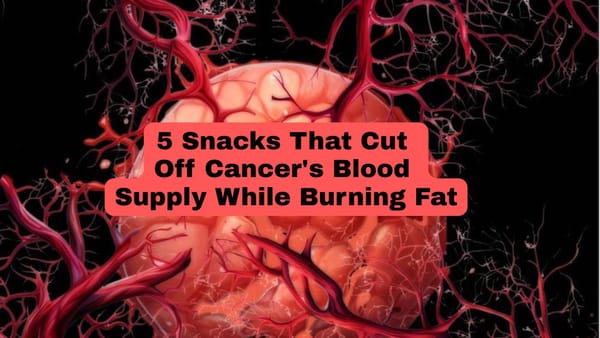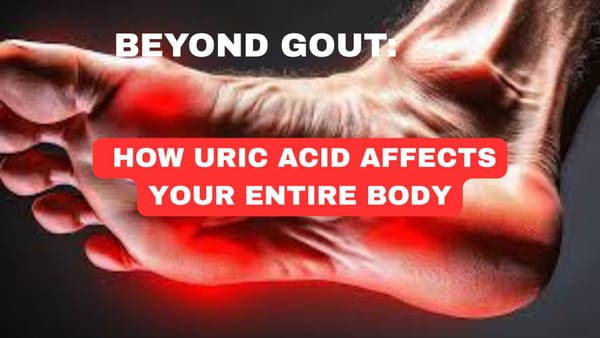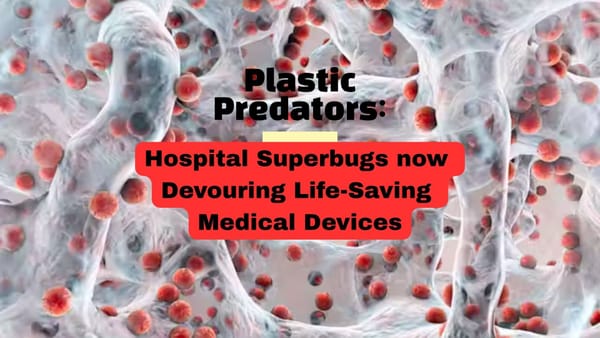Fat on the Brain: The Science Behind Animal Fat's Impact on Brain Health and Performance
Omega-3 component DHA is responsible for the development, growth and maintenance of the human brain. Plants do not contain any of the essential fatty acid.
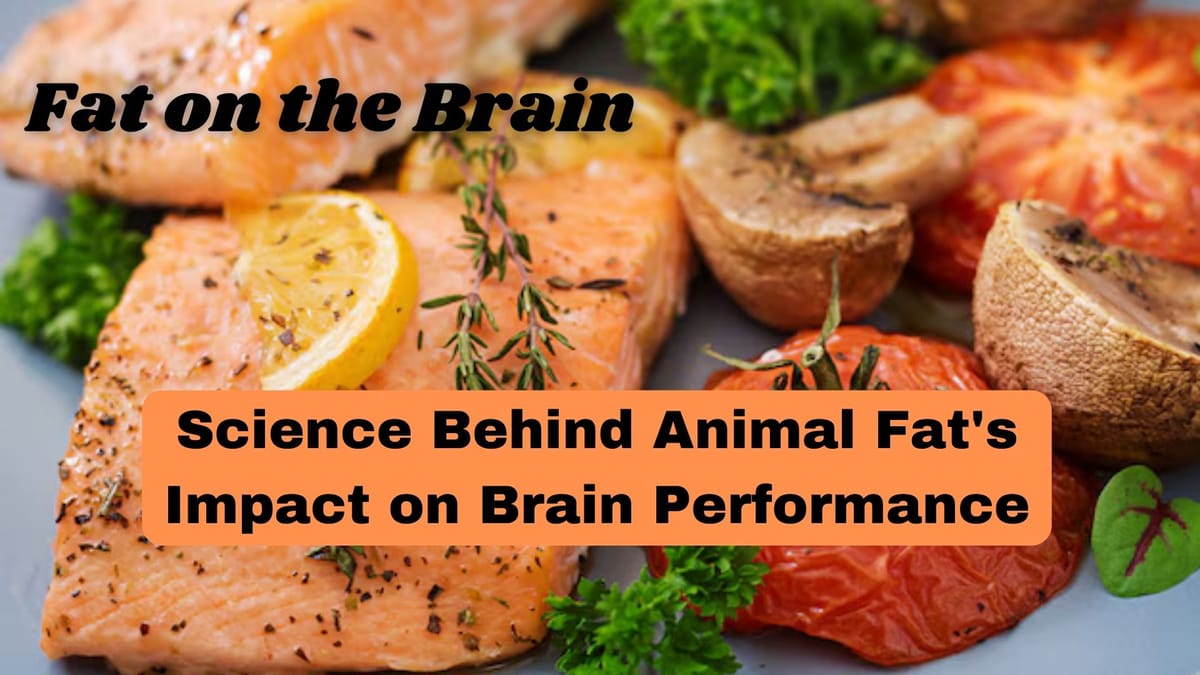
Why Humans Can't Thrive on Plants Alone
Hello readers, today I want to delve into a sensitive but vital topic of ensuring adequate omega-3 fatty acid, DHA (docosahexaenoic acid) in our diets. This is a powerful nutrient, and understanding its role is essential for optimal health and brain function.
The Facts About Omega-3 Fatty Acids
We think of fat as bad—the less we eat, the less we carry on our bodies, the better. This is not the right way to think about it. Fat is not just for insulation and energy storage, it’s also for nutrient absorption, cell signalling, immune function, and many other critical processes. Many think the main difference between plant and animal fats is that animal-sourced foods contain more saturated fat.
Recommended Reading

Some Surprising Facts about Fats in Plant vs Animal Foods
- All whole plant and animal foods naturally contain both saturated and unsaturated fats.
- Some plant foods contain more saturated fat than animal foods, with coconut oil topping the charts at 90% saturated fat. That’s more than twice the saturated fat found in beef fat (tallow).
- The primary type of fat found in pork is a monounsaturated fatty acid (MUFA) called oleic acid, the same fat found in olive oil.
For decades we’ve been told to avoid saturated fats—particularly those from animal foods, and to consume “heart-healthy,” cholesterol-free fats from plant foods such as seeds, nuts, and olives. Public health officials say these plant fats are important because they contain two essential PUFAs (polyunsaturated fatty acids) that the human body can't manufacture:
- The essential dietary omega-3 PUFA is called alpha-linolenic acid (ALA for short)
- The essential dietary omega-6 PUFA is called linoleic acid (LA for short)
What often goes unsaid is that both ALA and LA are found in a wide variety of both plant and animal foods, so it is easy to obtain both PUFAs regardless of our dietary preferences, as long as we include enough fat in our diets.
Our bodies are not looking for ALA and LA, they’re looking for something better. ALA and LA are considered “parent” omegas because they manufacture the omegas we badly need: EPA, DHA, and ARA—none of which exist in plant foods.
EPA (eicosapentaenoic acid) is an omega-3 PUFA whose function is primarily anti-inflammatory and healing.
ARA (arachidonic acid) is an omega-6 often thought of as a “bad” fatty acid because it promotes inflammation and is only found in animal foods (and algae). Yet ARA shoulders countless other responsibilities, and even promotes healing.
WHAT IS DOCOSAHEXAENOIC ACID (DHA), AND WHY IS IT SO VITAL FOR HUMANS?
Docosahexaenoic acid (DHA) is an omega-3 fatty acid that is a primary structural component of the human brain, cerebral cortex, skin, and retina. Fat is not just for insulation and energy storage. It is essential for nutrient absorption, cell signalling, immune function, and many other critical processes.
DHA is a remarkable molecule. It has participated in crucial processes throughout 500 million years of evolution, remaining unchanged due to its immense value.
- It helps form myelin, the protective sheath around our brain circuits facilitating communication.
- DHA maintains the integrity of the blood-brain barrier, shielding our brains from harm.
- Most importantly, it is critical for the development of the human cortex - the control centre for higher-order thinking, decision-making, and complex problem-solving.
- DHA plays a “unique and indispensable role” in the “neural signalling essential for higher intelligence.” — Simon Dyall Ph.D., Lipid Research Scientist Bournemouth University, UK
- Professor Michael Crawford, a pioneering British scientist studying essential fatty acids for 50 years, theorizes that DHA’s special configuration lends it unique quantum mechanical properties that allow it to buffer electron flow. This may explain why we find it in places throughout the brain and body where electricity is important: synapses where brain cell signalling takes place; mitochondria, where the electron transport chain is busy turning food into stored energy; and the retina of the eye, where photons of sunlight are transformed into electrical information.
- The most rapid development phase of an infant's cortex happens between the beginning of the third trimester of pregnancy and age 2. If enough DHA isn’t available to the baby during this critical 27-month window, it is unclear whether the consequences can be completely undone.
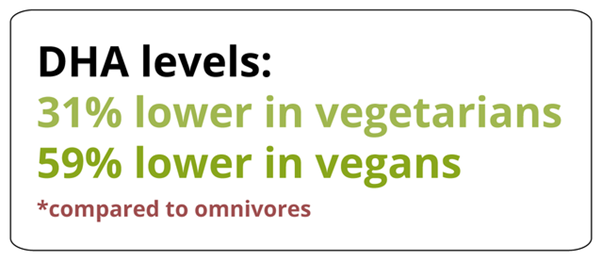
We see lower levels of DHA in people diagnosed with psychiatric disorders, including those which manifest early in life, such as autistic spectrum disorders and ADHD.
Interesting Fact: Plants do not contain any DHA. The omega-3 found in plant sources like flax, walnuts, and chia is alpha-linolenic acid (ALA), which the human body struggles to convert into the all-important DHA we need. Most studies show an ALA to DHA conversion rate below 10%, and some find zero conversion.
How Can We Ensure We're Getting Enough of this Vital Nutrient?
- The easiest solution is to include fatty fish like salmon, mackerel, and sardines in our diets. Other good sources are eggs, meat, and dairy from grass-fed animals. (See the below table for DHA values)
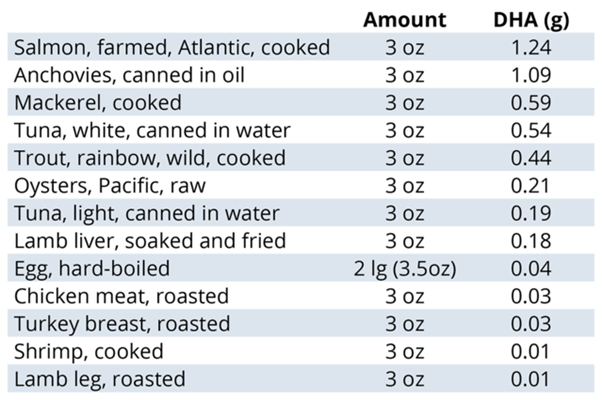
- For those who follow plant-based diets, supplementing with algae-derived DHA is highly recommended, especially during pregnancy, breastfeeding, and for children under 2. Consuming seaweed and algae doesn't guarantee you'll absorb the DHA, so supplements are safe.
- We should minimize refined vegetable oils like soybean and sunflower oil. These are extremely high in linoleic acid (an omega-6), which can hinder DHA production and tilt the body toward excessive inflammation if consumed in excess. Opt for olive, avocado, coconut, or red palm oils instead.
While some questions remain about ideal DHA intake levels across different life stages, minimizing vegetable oils and including DHA-rich foods or supplements appears prudent to support brain health.



